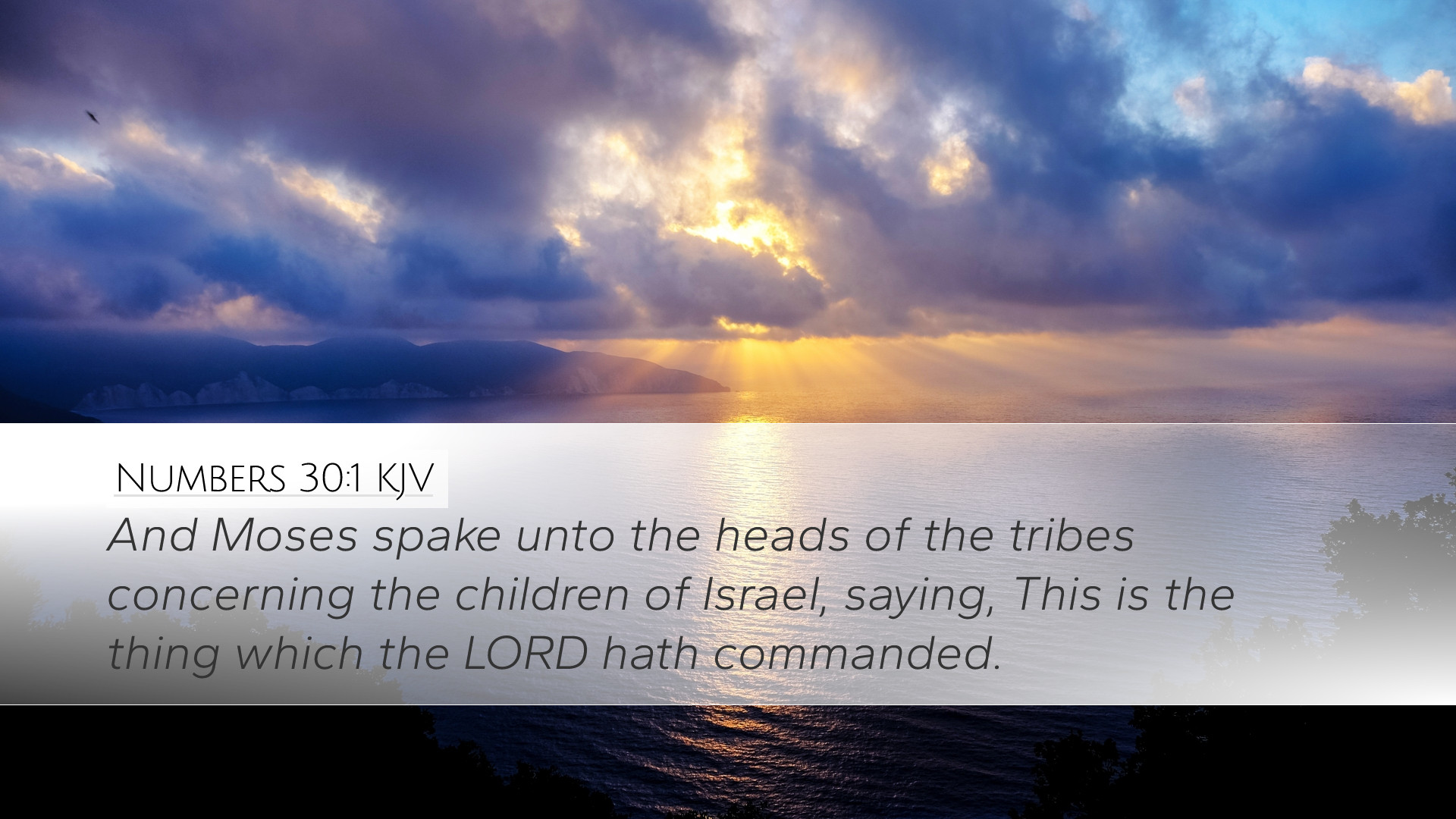Commentary on Numbers 30:1
Verse: "And Moses spake unto the heads of the tribes concerning the children of Israel, saying, This is the thing which the Lord hath commanded."
Introduction
This verse serves as a significant transition in the Book of Numbers, where Moses conveys specific laws that pertain to vows and oaths. The pronouncement is directed specifically to the leaders of the tribes, emphasizing the importance of authority and communal responsibility in spiritual matters.
Contextual Background
The context of this command involves the Israelites during their wilderness journey, where they are called to live in obedience to God's covenant. The head of each tribe is given the responsibility to understand and pass down these commandments, highlighting the continued leadership role of Moses and the emphasis on societal order.
Insights from Matthew Henry
Matthew Henry highlights that this verse indicates an organized structure in Israel's leadership, portraying Moses as a mediator who communicates God’s will to the leaders, ensuring that every command is transmitted through proper channels. He notes:
- Responsibility of Leaders: Moses speaks to the “heads of the tribes.” This indicates that communing with God entails a hierarchy where leaders are accountable for the adherence of their people.
- Divine Command: The phrase “This is the thing which the Lord hath commanded” underscores the absolute authority of God's word over human decisions, instilling a fear of God which is crucial for obedience.
Insights from Albert Barnes
Albert Barnes elaborates on the significance of communicating divine commands through Moses, illustrating several important points:
- Mosaic Authority: Moses acts as an intermediary between God and the people, which signals the importance of respecting and following spiritual authorities established by God.
- Order and Structure in Worship: The careful manner in which these commands are given to the leaders emphasizes God's desire for order not just in worship but in daily living, prompting the community to consider their vows seriously.
- Vows and Accountability: The next sections in Numbers delve into how vows impact community dynamics, portraying both individuals and community standards of accountability.
Insights from Adam Clarke
Adam Clarke provides a theological and practical perspective regarding Moses' communication of God’s commands to the tribe leaders:
- Direct Command from God: Clarke emphasizes that the presence of God's command implies a direct obligation on the Israelites to comply, demonstrating God’s ongoing engagement with His people.
- Symbol of Unity: The act of gathering tribe leaders symbolizes unity and shared responsibility in spiritual matters, encouraging solidarity among the tribes.
- Influence of Vows: Vows made by individuals affect the entire community's standing before God, thus highlighting the importance of being cautious and deliberate in making promises.
Theological Implications
This verse and its message reflect key theological principles that resonate well beyond the time of Moses. Some of these principles include:
- Leadership and Accountability: Church leaders today are reminded of their role in guiding their communities with integrity and wisdom, echoing the same structure established among the tribes.
- The Sovereignty of God’s Command: The insistence on obedience to divine commands exemplifies the need for faithfulness among believers, urging modern audiences to treat their commitments with highest regard.
- Community Responsibility: Understanding individual vows within the community context promotes a sense of collective spirituality where believers are called to uplift and encourage one another.
Practical Applications
In synthesizing the lessons from Numbers 30:1, contemporary believers can find numerous practical applications:
- Careful Consideration of Commitments: Just as the Israelites needed clarity in understanding their vows, believers today should also consider their commitments before God and others with seriousness.
- Respect for Spiritual Authority: Acknowledging the roles of church leadership facilitates structure and guidance within faith communities, promoting spiritual growth and order.
- Encouraging Community Engagement: By engaging with one another in spiritual discussions about vows and commitments, believers foster a spirit of accountability and strengthen their faith journeys.
Conclusion
Numbers 30:1 serves as a profound reminder of the way God communicates expectations to His people through established authority. The insights gathered from public domain commentaries affirm the ongoing relevance of such commands today. As believers seek to live out their faith in a complex world, the principles found within this verse challenge them to act with mindfulness, unity, and faithfulness.


